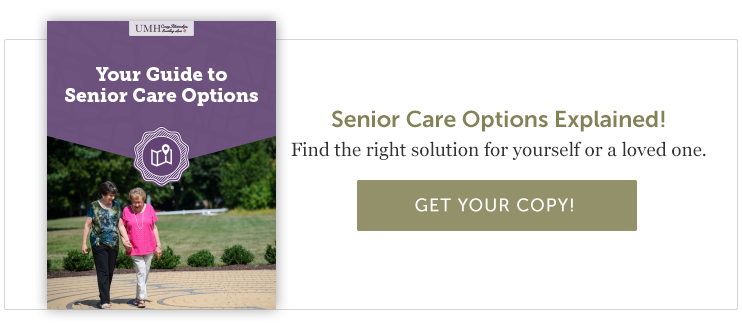The Differences Between All 8 of The Senior Care Options
Navigating the world of senior living and care options can be pretty tricky.
Wouldn’t it be nice to have a road map? Or maybe just something (or someone) to help guide you along the best path?
Whether you are planning ahead to avoid a crisis or you are scrambling to take care of an immediate need, you probably need help finding the most practical solution for your aging loved one’s changing care needs.
Yes, there are many senior housing options to choose from and no simple answer to the question of which one is right for you. But, here’s the upside of having so many choices: you stand a better chance of finding one that matches well with your long-term goals, so let’s get to it!
Here are 8 distinct senior care options for you and your loved one to consider:
1. Independent Living Communities
Also known as Retirement Homes, Senior Housing or Senior Apartments; these living arrangements can either be apartment complexes, condominiums or free-standing homes. Housing is usually fully equipped and easy to navigate. Some are extravagant, offering a wide range of social amenities and fine dining. Others provide just the basics.
This facility is right for you (or your loved one), if:
- You’re fully independent, aside from a few minor medical needs.
- You like the idea of socializing.
- You would like to enjoy a wide variety of amenities included in your monthly rent. Trash and snow removal, emergency call-for-aid systems, a-la-carte meals and access to a wellness center and library are all available to you.
- You're looking to downsize from the family home but not quite ready for assisted living.
If independent senior living in Connecticut sounds like something you'd be interested in, visit https://offers.umh.org/wesley-village-cottage-living to learn more about the newly-renovated and affordable Wesley Village Cottages.
2. Assisted Living Communities
Also known as Assisted Care Community or Personal Care Home; this facility allows residents to live in private apartments, occupy private rooms or share with a roommate and receive assistance with activities of daily living (ADLs). Most have communal dining, recreational programs and areas, transportation services and a variety of housekeeping, laundry and maintenance services; some facilities are modest while others are lavishly designed. They host regularly scheduled social and interactive events.
This facility is right for you (or your loved one), if:
- You’re no longer able to live at home safely but do not require a high level of care.
- Cooking is becoming too difficult to manage. Enjoy award-winning fine dining options at UMH Assisted Living Communities.
- You would feel safer with 24-hour emergency response, just in case.
- You can't drive anymore. Most assisted living communities offer comprehensive transporation to your doctors' appointments or errands, as well a housekeeping and laundry services.
- You want to take full advantage of a plethora of social opportunities while you still can, such as lunch outings, Wii bowling leagues, gardening clubs, and fitness programs.
- You need more personal care services (assistance with personal hygiene and dressing, medication management, escorts, and help managing incontinence) not feasible at a retirement home or other independent living option.
UMH offers a variety of assisted living options in Shelton, Farmington and Newington, Connecticut. Depending on where you're located, learn more about our award-winning assisted living communities.
3. Nursing Homes
Also known as Convalescent Care, Skilled Nursing or Long term Care; this facility accommodates the highest level of care in either a private room or shared room. Scheduled activities are available and meals are served in a central dining area or in the resident’s room.
This facility is right for you (or your loved one), if:
- You’re a frail elderly or disabled person who requires 24 hour skilled assistance with things like feeding and lifts in and out of bed.
- You require short-term rehabilitative care (recovering from surgery or illness). This care may include: Surgical & Medical Recovery, Orthopedics/Joint Replacement, Cardiac & Pulmonary Care, Respiratory Rehab, IV Therapy and Palliative Rehab.
- Preparing meals is out of the question. On-site dieticians ensure healthy meal options in open dining spaces.
4. Memory Support
Also known as Dementia Care or Memory Care, this special community generally allows residents to live in private or semi-private apartments with structured activities delivered by trained personnel. The living environment has fully secured areas to prevent residents from wandering off.
This facility is right for you (or your loved one), if:
- You have memory problems and need specialized assisted living for increased care needs.
- You need specialized dementia care and services such as a wander-management system and 24-hour staffing.
- You need engaging activities, support & personalized routines designed with physical, social and cognitive challenges in mind.
5. Respite Care
Also known as Short-Term Stay Programs or Adult Day Care; these options may be available within the assisted living community for a short time frame, usually a matter of days or up to a month. Most Adult Day Care centers offer programs during the day, but do not provide overnight accommodations.
This facility is right for you (or your loved one), if:
- You are a caregiver and need a temporary break.
- You need a “getting acquainted” period for your loved one.
6. Residential Care Homes
Also known as Board and Care Homes, Group Homes or Adult Family Homes; these facilities offer a similar setting to in-home care and with live-in care-takers. Senior care services may vary greatly, but most offer assistance with activities of daily living (ADLs) and recreational opportunities.
This facility is right for you (or your loved one), if:
- You want the feel of a home and need assistance with ADLs.
- You only need very limited, temporary medical care.
- You want a more private setting than is available in other settings.
7. Home Care Companies
Also known as Home Health Care or In-home Personal Care, this option allows you to stay in your own home and have health care services brought in. Residents often have their homes modified to accommodate their changing needs. They have access to a range of home care services that include in-home help to daycare services.
Investment cost: modifying your home will attract a one-time payment, plus hourly costs for in-home services.
Remaining at home is right for you (or your loved one), if:
- You’ve no desire to be anywhere else but need assistance with ADLs.
- Your neighborhood is safe and you have a network of family and friends nearby.
- You can afford and feel comfortable with home-care aids around the clock or as often as needed.
8. Hospice Care
Hospice is end-of-life care for individuals in the final stages of an incurable disease. With a focus on quality of life over length of life, this patient and family-focused service is not aimed at finding a cure, but instead offers relief for disease-related symptoms while promoting dignity, comfort and quality of life during an individual’s final days.
Many communities have multiple hospice providers, so the task of selecting an agency belongs to the individual’s family. While this involves some legwork, it's a valuable use of your time. If possible, discussions about hospice should take place early enough so that the patient can be involved in the decision.
While physicians or hospital discharge workers may initiate a conversation about hospice options, family members can also initiate the conversation. Other referral sources include local organizations, such as the American Cancer Society or the Visiting Nurse Association. Your state’s department of health and social services or regional hospice organization may also provide a list of licensed care agencies. Your place of worship, friends and community members who have received hospice care are also helpful resources.
Selecting hospice care involves a mix of logistical and personal factors. Begin by identifying agencies that are accredited, certified and licensed by a nationally recognized group. Determine how long a particular agency has been in existence, and be sure to check professional references: a good agency should be happy to provide them. Other places to consult? Your local Consumer Bureau or the Better Business Bureau.
You should also determine what types of services are provided and by whom. Many hospices offer a care plan for each patient; ask to see a sample to determine whether it adequately meets your needs and expectations.
Also, the quality of your hospice home care staff member is just as important as the quality of the agency itself; after all, these professionals will be with your loved one during his/her final days. A face-to-face interview can help you determine whether a candidate is the right fit.
Hospice Care is right for you or your loved one if:
- You or your loved one has an incurable disease
- You need continued care
- It's the best decision for your loved one
The end of life transition can be so difficult and the staff at Bishop Wicke is there to help. Contact Bishop Wicke Health and Rehabilitation Center to learn more about their hospice program.
Review all of these factors to determine which senior care option is best for your loved one.
Then download "Your Guide to Senior Care Options" and take a closer look at all of the options available:
About Chelsea Sayegh
I started working as a Marketing Coordinator for United Methodist Homes in October of 2016. I work on public relations, website management and community planning for their award winning independent and assisted living communities. As a graduate of Ursinus College with a degree in Media and Communications and a passion for serving nonprofits, United Methodist Homes has become my home away from home. I spend my days working in a community filled with smiling faces, helpful hands and wonderful residents. I have a passion for assisting seniors and take great pride in being able to promote a company with such a positive mission and values. As an individual committed to learning and growing, I have jumped right into this exciting career!

Our Blog is a 2016 Platinum Generations Award Winner! The Generations Award is an annual international competition for excellence in senior marketing recognizing professionals who have communicated to the 50+ Mature Markets.




